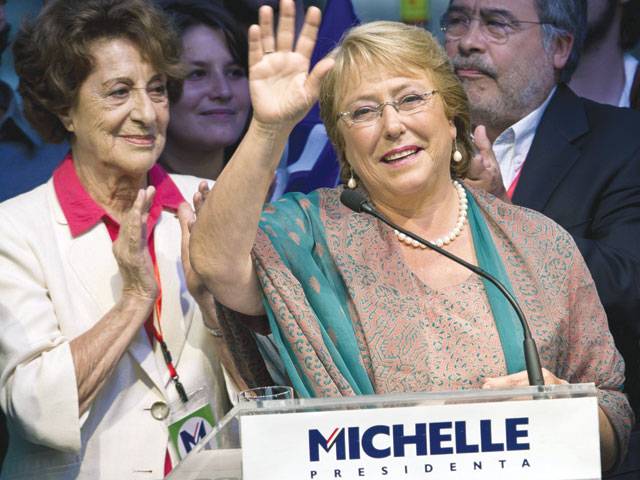SANTIAGO : Socialist Michelle Bachelet easily trounced her conservative rival Sunday and was swept back into Chile’s presidency on a platform of narrowing the gap between the rich and poor.
One of the first challenges for Bachelet, who was president 2006-2010, will be to dampen the soaring expectations for quick changes as Chile’s booming economy loses steam with Asian demands for Chile’s copper diminishing.
Bachelet defeated conservative Evelyn Matthei in a landslide, 62 percent to 38 percent, according to official returns. The race marked the first time in Latin America that a presidential runoff was held between two women.
“Chile, now, finally, the time has come to carry out the changes,” Bachelet, joined by her children and mother Angela Jeria, told cheering supporters in Santiago shortly after her resounding victory.
The 62-year-old president-elect takes office March 11 to succeed conservative billionaire President Sebastian Pinera for a term running through 2018.
This is a “historic” moment for Chile, Bachelet said, because the country “has decided that this is the time to carry out far-reaching reforms” such as free post-secondary education, raising taxes and adopting a new, more modern constitution.
Bachelet praised the thousands of student protesters who, starting in 2011, held massive street protests demanding free, quality university education.
“Money is not what should be driving education. Education is not merchandise. Dreams are not something that you go out and buy; everyone has the right to have them,” Bachelet said.
“It isn’t going to be easy” to carry out the necessary social and economic changes, Bachelet said. “But since when was it ever easy to change the world for the better?”
In this second term Bachelet will have a chance to cement her legacy as a transformative leader with reforms aimed at overhauling the constitution and the government structure, a legacy of the 1973-1990 military dictatorship of Augusto Pinochet.
Matthei, 60, and Bachelet, 62, are both daughters of Air Force generals and knew each other as schoolgirls.
But while Bachelet’s father died after being tortured for remaining loyal to leftist president Salvador Allende in the 1973 coup, Matthei’s father supported the 1973-1990 dictatorship of Augusto Pinochet.
Bachelet was also tortured, fled the country, then returned years later to work as a pediatrician, eventually entering politics.
High stakes for Bachelet’s second term
Bachelet focused her 2013 campaign on promises of greater social justice in a country that has the highest per capita income of any Latin American country.
She has proposed increasing taxes to raise $8.2 billion for the state coffers, and wants to provide universally free access to post-secondary education.
As part of her ambitious reform agenda, Bachelet hopes to bring Chile in line with a wave of social liberalism spreading across once-conservative Latin America, including by legalizing abortion and opening discussions on same-sex marriage.
But she has also complained that four years will not be enough to meet all of the high expectations for reform.
Even the students that she praised did not all support her: the more radical leaders say they mistrust her and called for their followers to abstain from voting.
They are also organizing a mass protest, along with environmentalists and gay rights groups, scheduled to be held four days after Bachelet takes office.
“For Bachelet it will be very complicated handling the high expectations created around her government,” political scientist Cristobal Bellolio told AFP.
Bachelet is also inheriting an economy that is losing steam after some five years at a five percent growth rate. Growth next year is forecast at between 3.75 and 4.75 percent.
Chile is the world’s top copper producer, and demand for copper has decreased in China, its main client.
In her first term, Bachelet reformed the pension system, improved health and social services, and focused on the well-being of Chile’s working class and elderly.
Her first term also coincided with a boom in global demand for copper.
Matthei, saddled with a divided conservative movement, promised during her campaign to improve the lives of Chile’s middle class.
But she was too closely linked to Pinera, a deeply unpopular president, and her complaints that Bachelet’s leftist ideas were “experiments that have failed in other countries” had little appeal.
The final vote results were the worst for any Chilean conservative candidate since democracy was restored in 1990.
Congratulations to the president-elect poured in from leaders across Latin America.
Thursday, April 25, 2024
Bachelet wins Chile presidential run-off

China-Pakistan Investment, Trade Symposium organised
April 25, 2024
KP CM aide hands over cheque to athlete
April 25, 2024
Musk vs Australia
April 25, 2024
Reforming Rehab
April 25, 2024
Tax It Right
April 25, 2024
Academic Uprising
April 24, 2024
Cooperation Momentum
April 24, 2024
Ending animal suffering
April 25, 2024
AI governance
April 25, 2024
AI concerns
April 25, 2024
Population paradox
April 24, 2024
Unveiling differences
April 24, 2024
ePaper - Nawaiwaqt
Advertisement
Nawaiwaqt Group | Copyright © 2024





